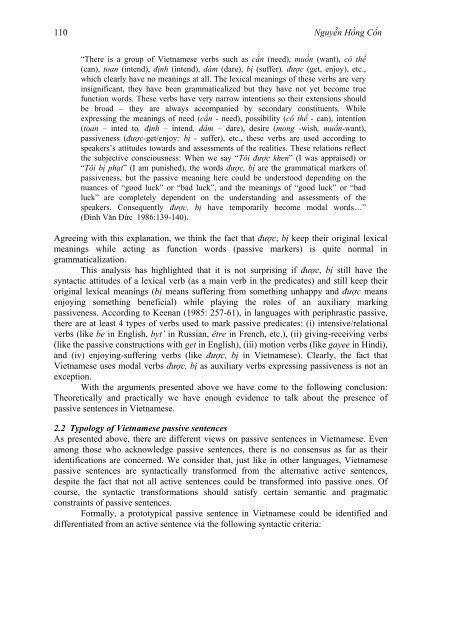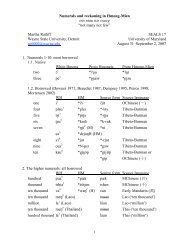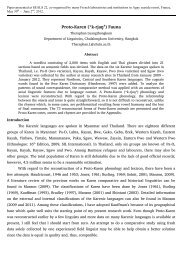proto-southwestern-tai revised: a new reconstruction - seals 22
proto-southwestern-tai revised: a new reconstruction - seals 22
proto-southwestern-tai revised: a new reconstruction - seals 22
Create successful ePaper yourself
Turn your PDF publications into a flip-book with our unique Google optimized e-Paper software.
110 Nguyễn Hồng Cổn<br />
“There is a group of Vietnamese verbs such as cần (need), muốn (want), có thể<br />
(can), toan (intend), định (intend), dám (dare), bị (suffer), được (get, enjoy), etc.,<br />
which clearly have no meanings at all. The lexical meanings of these verbs are very<br />
insignificant, they have been grammaticalized but they have not yet become true<br />
function words. These verbs have very narrow intentions so their extensions should<br />
be broad – they are always accompanied by secondary constituents. While<br />
expressing the meanings of need (cần - need), possibility (có thể - can), intention<br />
(toan – inted to, định – intend, dám – dare), desire (mong -wish, muốn-want),<br />
passiveness (được-get/enjoy; bị - suffer), etc., these verbs are used according to<br />
speakers’s attitudes towards and assessments of the realities. These relations reflect<br />
the subjective consciousness: When we say “Tôi được khen” (I was appraised) or<br />
“Tôi bị phạt” (I am punished), the words được, bị are the grammatical markers of<br />
passiveness, but the passive meaning here could be understood depending on the<br />
nuances of “good luck” or “bad luck”, and the meanings of “good luck” or “bad<br />
luck” are completely dependent on the understanding and assessments of the<br />
speakers. Consequently được, bị have temporarily become modal words…”<br />
(Đinh Văn Đức 1986:139-140).<br />
Agreeing with this explanation, we think the fact that được, bị keep their original lexical<br />
meanings while acting as function words (passive markers) is quite normal in<br />
grammaticalization.<br />
This analysis has highlighted that it is not surprising if được, bị still have the<br />
syntactic attitudes of a lexical verb (as a main verb in the predicates) and still keep their<br />
original lexical meanings (bị means suffering from something unhappy and được means<br />
enjoying something beneficial) while playing the roles of an auxiliary marking<br />
passiveness. According to Keenan (1985: 257-61), in languages with periphrastic passive,<br />
there are at least 4 types of verbs used to mark passive predicates: (i) intensive/relational<br />
verbs (like be in English, byt’ in Russian, être in French, etc.), (ii) giving-receiving verbs<br />
(like the passive constructions with get in English), (iii) motion verbs (like gayee in Hindi),<br />
and (iv) enjoying-suffering verbs (like được, bị in Vietnamese). Clearly, the fact that<br />
Vietnamese uses modal verbs được, bị as auxiliary verbs expressing passiveness is not an<br />
exception.<br />
With the arguments presented above we have come to the following conclusion:<br />
Theoretically and practically we have enough evidence to talk about the presence of<br />
passive sentences in Vietnamese.<br />
2.2 Typology of Vietnamese passive sentences<br />
As presented above, there are different views on passive sentences in Vietnamese. Even<br />
among those who acknowledge passive sentences, there is no consensus as far as their<br />
identifications are concerned. We consider that, just like in other languages, Vietnamese<br />
passive sentences are syntactically transformed from the alternative active sentences,<br />
despite the fact that not all active sentences could be transformed into passive ones. Of<br />
course, the syntactic transformations should satisfy cer<strong>tai</strong>n semantic and pragmatic<br />
constraints of passive sentences.<br />
Formally, a <strong>proto</strong>typical passive sentence in Vietnamese could be identified and<br />
differentiated from an active sentence via the following syntactic criteria:





